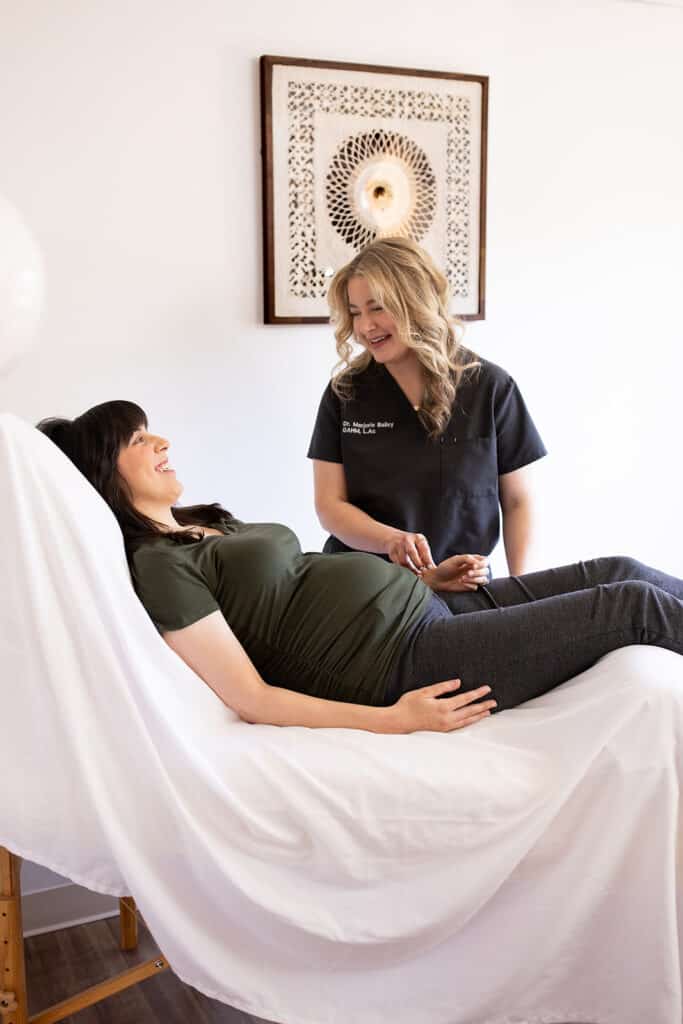
If you’re in your 40s or early 50s and starting to notice changes in your cycle, sleep, or mood, you’re not alone. Many women experience intense, confusing perimenopause symptoms that happen way before they start missing periods. These symptoms often start subtly, but during late perimenopause, symptoms tend to intensify as your body moves closer to menopause.
While these symptoms are common, they’re not something you have to simply “put up with.” Natural therapies like acupuncture, herbal medicine, and supportive care can help you feel more like yourself again.
Ready to get some relief? Schedule a consultation with Willow Tree Clinic to work with a team that specializes in women’s health, fertility, and hormone transitions right here in Portland.
Willow Tree Clinic is a trusted provider of acupuncture and therapeutic massage focused on women’s health. Whether you’re navigating perimenopause, preparing for pregnancy, or dealing with chronic discomfort, our personalized, compassionate approach can help you feel better, without relying on medications or guesswork. If you’ve been searching for support and wondering where to start, a visit to Willow Tree is a great first step.
What is Late Perimenopause?
Perimenopause refers to the transitional years leading up to menopause. While the full transition can last anywhere from 4 to 10 years, late perimenopause specifically refers to the final stage, which is usually the last one to two years before your final menstrual period.
During this time, hormone levels fluctuate more dramatically and erratically. You might go months without a period, only for it to return suddenly and heavily. These shifts often bring with them stronger symptoms than the earlier stages of perimenopause.
Late perimenopause symptoms officially end once you’ve gone 12 consecutive months without a menstrual period. This is one of the key signs perimenopause is ending and menopause officially begins.

Common Symptoms in Late Perimenopause
While everyone experiences this transition differently, many symptoms that begin in early perimenopause tend to worsen or become more disruptive in the later stages. Common late perimenopause symptoms include:
- Hot flashes and night sweats
- Mood changes such as anxiety, irritability, or sadness
- Brain fog and difficulty concentrating
- Irregular or skipped periods
- Sleep disturbances, including trouble falling or staying asleep
- Perimenopause weight gain and changes, especially around the abdomen
- Fatigue that doesn’t improve with rest
- Joint or muscle aches
These symptoms often overlap with daily life stressors, which makes them easy to dismiss. But if you’ve noticed patterns that feel more intense or new, your body may be signaling that you’re entering late perimenopause.
Why These Symptoms Intensify
Hormonal fluctuations in late perimenopause aren’t linear—they often spike and drop without much warning. Estrogen, progesterone, and cortisol (your stress hormone) all play a role in how you feel physically and emotionally during this time.
For example:
- Lower estrogen levels can impact temperature regulation and lead to hot flashes.
- Reduced progesterone may contribute to anxiety or difficulty sleeping.
- Cortisol often increases with age and stress, making you feel wired, tired, or emotionally off-balance.
These hormonal shifts can make your usual self-care routines feel ineffective. That’s why many women turn to Chinese medicine and acupuncture as targeted, personalized support to relieve late perimenopause symptoms.

Natural Ways to Ease Late Perimenopause Discomfort
While there’s no one-size-fits-all solution, a few simple strategies can help manage late perimenopause symptoms:
- Prioritize rest and sleep hygiene. Even if sleep is interrupted, keeping a consistent bedtime, limiting screens at night, and creating a calming wind-down routine can help.
- Stay active, but gently. Walking, yoga, or strength training support bone health and mood without overtaxing the nervous system.
- Eat for hormone support. Focus on whole foods, stable blood sugar, and healthy fats to support metabolism and reduce inflammation.
- Track your symptoms. Identifying patterns with a journal or app can help you anticipate and prepare for symptom flares.
If you’re looking for structured guidance through this phase, Willow Tree Clinic offers a self-paced course that many patients find helpful: Supporting Your Cycle: A Guided Fertility & Hormone Reset.
How Acupuncture and Herbal Medicine Can Help

Acupuncture and herbal medicine offer non-invasive, deeply supportive ways to relieve perimenopausal symptoms. At Willow Tree Clinic, we use these tools to target the root causes of your discomfort—whether it’s sleep disruption, mood swings, or hormone-related inflammation.
Here’s how they help:
- Acupuncture stimulates the nervous system and supports hormone regulation. Many women report better sleep, improved mood, and fewer hot flashes within a few sessions.
- Herbal medicine can offer relief for night sweats, irritability, or irregular cycles. These perimenopause supplements are customized based on your unique pattern of symptoms, not a one-size-fits-all supplement.
- Ongoing care means your treatment adapts as your body changes. We regularly reassess your pulse, tongue, and symptom profile to make sure you’re getting what you need, when you need it.
Most importantly, you’re not doing this alone. Our team understands the nuances of late perimenopause symptoms and provides practical, effective support for every stage of the transition.
If you’ve been searching for “chinese medicine near me” and feeling overwhelmed by options, Willow Tree Clinic offers care you can trust. Whether you’re dealing with hot flashes, brain fog, or just don’t feel like yourself, we’re here to help. Schedule your consultation and take the first step toward relief that’s natural, personalized, and grounded in years of clinical experience.

Tune-Up Acupuncture: Why Fall Is the Perfect Time to Reset Your Health
If you’ve ever felt a little off as the seasons change (maybe more tired, more tense, or more moody than usual) you’re not alone. This

What’s Going On With My Gut? Understanding Perimenopause Digestive Issues
If you’ve noticed your digestion changing during your 40s, you’re not imagining it. Bloating, constipation, diarrhea, or unpredictable food sensitivities can all appear during the

Herbal Remedies for Immune System Support: Boost Your Body’s Defenses Naturally
When your immune system is running smoothly, you feel it—you have more energy, bounce back faster from colds, and can handle seasonal changes without getting

Acupuncture for Hot Flashes: Natural Relief During Menopause
Hot flashes can feel like your body is turning against you. You feel heat surges out of nowhere, sweat pools instantly, and sleep goes out

Herbal Medicine for Stress Relief: Finding Calm in a Busy World
We live in a fast-moving world—and our nervous systems often bear the brunt. If you’re navigating long workdays, caregiving responsibilities, hormonal shifts, or just the

When Stress Takes Over: How Cortisol Affects Your Body—and the Subtle Signs You Might Be Ignoring
We all expect stress to show up during life’s big moments, like a job interview, a family emergency, or an unexpected change. But what about
